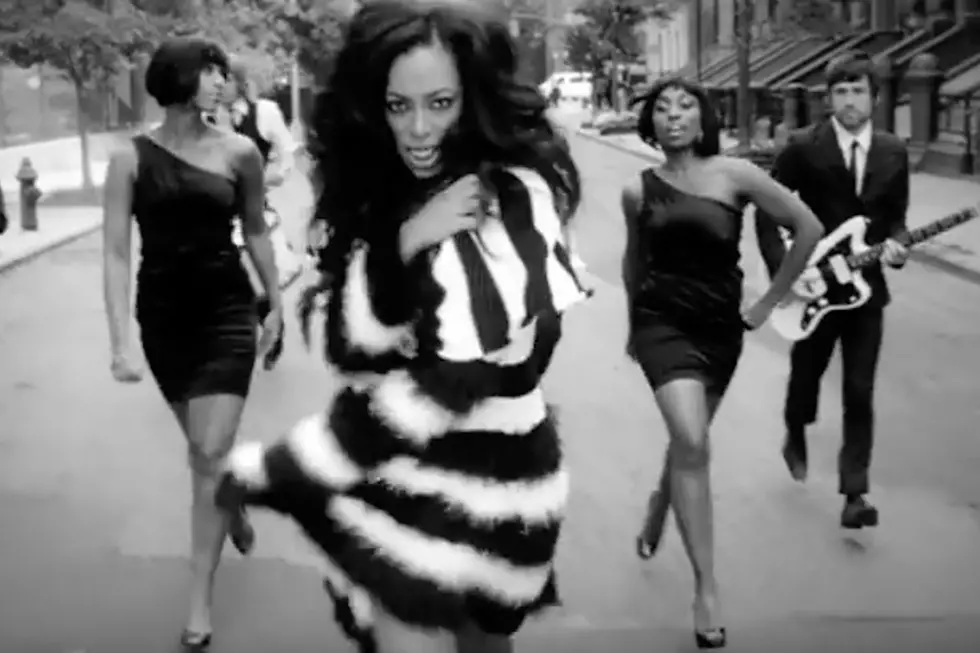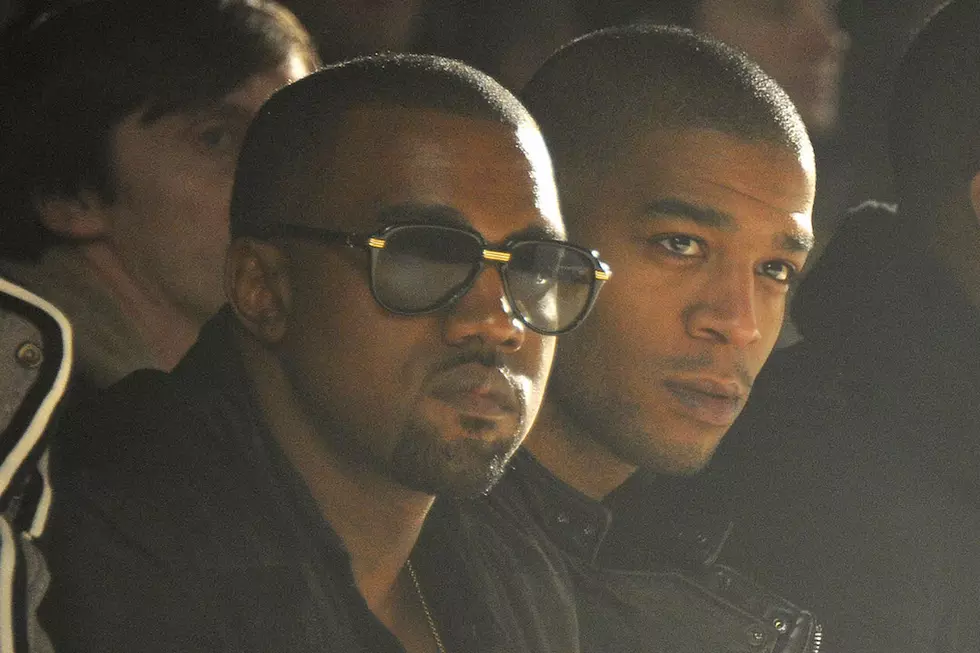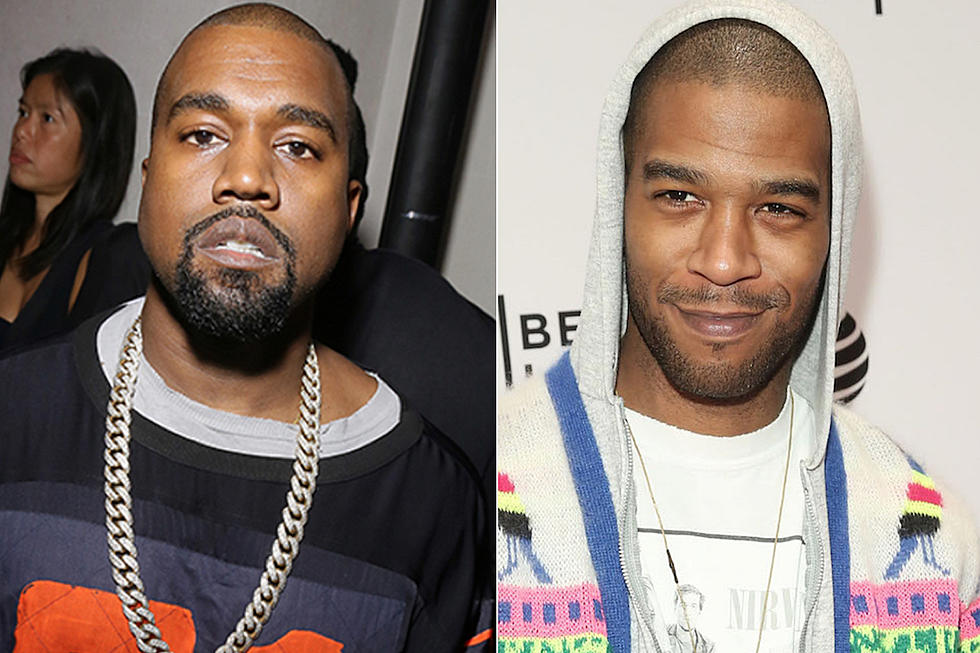
Kid Cudi to ‘Bring Beautiful Back’ on Conceptual Debut
 Kid Cudi -- hip-hop's newest prodigal son -- released his full-length debut, 'Man On The Moon: The End Of Day,' this week after a lengthy wait. Having to live up to the hype of his well-received 2008 mixtape, 'A Kid Named Cudi,' and the ubiquitous Top 10 hit single 'Day n Night,' reviews of Cudi's GOOD/Universal Motown debut have been pretty excellent thus far. 'Man On The Moon,' with a production team that includes tastemakers Plain Pat, Emile, Dot da Genius, attempts to bridge hip-hop and electro-rock with guests ranging from rappers Kanye West and Common to MGMT and Ratatat.
Kid Cudi -- hip-hop's newest prodigal son -- released his full-length debut, 'Man On The Moon: The End Of Day,' this week after a lengthy wait. Having to live up to the hype of his well-received 2008 mixtape, 'A Kid Named Cudi,' and the ubiquitous Top 10 hit single 'Day n Night,' reviews of Cudi's GOOD/Universal Motown debut have been pretty excellent thus far. 'Man On The Moon,' with a production team that includes tastemakers Plain Pat, Emile, Dot da Genius, attempts to bridge hip-hop and electro-rock with guests ranging from rappers Kanye West and Common to MGMT and Ratatat.
With a feature on Jay-Z's 'Blueprint 3,' and a performance with Hova at his 'Answer the Call' 9/11 concert, it's pretty hard to escape the Cleveland-bred artist lately. Graciously, he took some time out of a busy schedule to meet with The BoomBox and break down his new record, success, influences and the myth of the Solo Dolo.
The BoomBox: Starting off, the first impression I got from 'Man On The Moon' is that you're deliberately messing with expectations a bit. It's hip-hop, but it's really just a collection of songs that pull from everywhere. Did you go into the record with this in mind?
Kid Cudi: It kind of just happened. In my head, I have how I want certain things to sound. I was very hands on with a lot of the production and making beats (with Plain Pat or Emile or Dot da Genius). Even 'Sky Might Fall,' which I made with Kanye [West] ... that was all my melody and my idea on the hook to bring things to life. It was the same kind of relationship with Dot da Genius on 'Day n Night.'
I just always have strong melodies in my mind. I'm always spittin' em out. I keep the production team small, which allows me to really be involved from the ground up. We built the sound. Emile was someone who had major influence, because he was ready to push the envelope on his production and I was ready to do the same. We met each other half way. Even Plain Pat ... We were all just on the same page. The fact that it fuses all those genres just sort of happened organically from that.
The BoomBox: What were you listening to while making the record?
The stuff that I listened to the most was probably MGMT and Ratatat. I was a super big fan of both groups even before I thought of attempting to reach out to them for the album. With MGMT, I was inspired by their lyrics. They really taught me to think outside the box when writing. Coldplay, too...
Ratatat really helped me think outside the box when it came to the production and when it came to melody and feeling. They have a lot of melodies in their production that just feel right. All their beats make colors. A typical hip-hop beat ... Well, sometimes they have melodies that are strong, but they're not beautiful. I wanted to bring beautiful back. Even the dark melodies on the album are beautiful.
Like 'My World' ... When it starts off and has those strings on the hook. It's just a beautiful, dark record. We went elegant with everything we did on this album. I wanted every song to be in good taste. Not [Cudi breaks into generic boom-bap beat with electro-synth melody]. You know, that cheesy synth/hard drums style of hip-hop that makes no sense? I wanted to be so abstract and next level that people were confused as to what it was.
That's that whole 'Man On The Moon' and Andy Kaufman connection. I was really inspired by him and his comedy because he pushed the envelope to the point where he wanted to confuse people and make them uncomfortable. That's kind of like what I wanted to do with my music: push the envelope and make people uncomfortable to the point where they can't tell what it is.
The BoomBox: Did you go into the record with the idea of splitting the songs into acts and building a story arc?
You can definitely follow along, and that was something I planned from the beginning. We had about five different combinations on how to setup a story. It's sort of like a movie. You shoot a bunch of scenes and edit it down. There's so many different ways you can edit a movie and have the story flow.
I don't like movies where it takes a bit to get to the action. With this record, I wanted to get right in. That's why on the fourth track you got 'Solo Dolo' - a slow and moody record - which is a pretty risky song to put that early in an album. With Common's narrative and how it comes in from 'Soundtrack 2 My Life' and 'Simple As...' being more upbeat, it throws that little curveball that makes things work.
I wanted to just catch people off guard. I wanted to reach into the darkness early on.
The BoomBox: The sequencing there really mimics that feeling when you get on top and then pull away for a second and reflect. It can get dark when you reminisce.
Exactly! This whole thing ... I wanted it to be just exactly how we live. Some things just don't make sense. The flow of the story makes sense, but there are scattered things. 'Soundtrack 2 My Life' touches on a lot of current s---. But then 'Solo Dolo,' like you were saying, kind of turns into reflecting and going to those moments when I was in East New York and broke.
'The Heart of a Lion' is talking about grinding and being right there and really trying to get people to hear me. These are all moments in time. We're just trying to kick it out there. Everything was meant to be dreamy and sequenced in a manner where you can get it, but still have room to interpret in your own way.
I didn't want to be so literal. You know, like 88 Keys' album was ... It was literal with the interludes. It worked really well there and was totally thought out, but I didn't want to paint everything for everybody. I don't want people to go, "Oh yes, this means this." I want people to be like, "I could take it this way, but he could have meant it this way." Lyrics are in the booklet, so you can follow along.
The BoomBox: The record is cinematic. Can you talk to me about the split between sound and vision? Do you plan on producing any video material?
It's meant to stimulate your mind and paint these images in your brain. With 'My World,' how that sample comes in is so subtle. It just has that bounce. Then, I wanted it to be like some type of God was telling the story when it gets all epic there in the chorus. At that point, it's God's true voice and then it goes back to my voice.
The cinematic thing I wanted to bring to the table was the orchestra, but I didn't want to do it in the sense that most hip-hop artists fail at. You know? Like that, "Yeah, man! There's strings on this beat!" I wanted to utilize the orchestra properly, like how it's used cinematically in a movie. Literally, I wanted you to feel like when you're in a movie theater with your eyes closed.
Even when we were doing a deal, like walking around to labels and meeting, I made sure every person I talked to knew that I didn't care about money and things like that. It was more like, "Make sure you have enough for my f---ing orchestra." I will not work if I cannot have that orchestra. The album would still be good, but it wouldn't paint that picture. It would be alright, but not great. People magazine would give it 3.5 stars rather than 4. You know what I'm saying?
There's a lot of artists that use orchestras, but ar
e just trying to be innovative in some way. I just took that and used it how it's supposed to be used.
The BoomBox: I can totally see that. You get a track with a cello and it's like, "Oh great, that's the one with the cello on top of everything."
So true! It really sticks out, doesn't it?
The interludes were specially written by Larry Gold. He wrote 'em all out. I went in the booth and wrote all the narratives out. We gave them to Larry and told him where we wanted to place them. He listened to those songs and made the glue. That's how it kind of segues and s---.
The BoomBox: Part of your story has been mythic in quality. In both press and the record, there's talk about this myth of Cudi. What was your original routine? How did you get started on the path that culminates with the release of 'Man On The Moon'?
I first started pursuing music when I was 15 and a freshman in high school. You know, I'd write my little raps to myself -- nothing really intense. I wasn't recording anything up until college. All I'd do in school is rap about brands and stuff. I was really intrigued by the lifestyle more than anything. There was, even in the early recordings, always this undertone of me trying to tell my story. There would be a couple songs about random bulls---, then I'd have a couple where I'd sing on the hook and the verses would be lyrically deeper.
I found an old song I did called 'The Rain.' I think it was like 2003 that I made this joint. I sampled the score from 'Antwone Fisher.' I remember it just being this really moody record. I sampled some vocals from the movie scene where he talks about the rain. I was really explaining what it was like growing up with my brother and my father. This was 2003. If someone was to listen to my old recordings, they'd see hints of Kid Cudi. They'd be like, "S---." I just grew up and realized my purpose. It's like, I'm not meant to talk about guns, drugs and flashy s---. I'm meant to talk about my struggle, hardship and internal battles. These are things that will eventually help kids.
My purpose became so clear once 'Day n Night' took off and people started responding to that. That was the eureka moment. The album and events leading up to that, it's sort of like the 'Law and Order' effect. That track was one of the first times in hip-hop that you get that lone man character wandering around at night, high out of his mind, pacing on bridges or whatever.
One thing I made sure not to do was glamorize that too much. Like, "Oh yeah, stoner rapping!" It's a dark thing. If you look at those lyrics on paper, it's a pretty depressing poem. I tricked people because I had this friendly melody and crazy beat. The lyrics are more Lykke Li or what they call "emo." It's like how parents trick their kids into taking vitamins. 'Day n Night' was like a Flintstones Vitamin. It was tasty, but it was good for you, too.
More From TheBoombox

![Kanye West Celebrates 41st Birthday with Pusha T and Kid Cudi [PHOTO]](http://townsquare.media/site/625/files/2016/09/Kanye-West-Kid-Cudi.jpg?w=980&q=75)



![Kanye West Reveals Possible ‘Kids See Ghosts’ Album Tracklist [PHOTO]](http://townsquare.media/site/625/files/2016/09/Kanye-West-Kid-Cudi.jpg?w=980&q=75)
![Kanye West Reveals Tracklist for Kid Cudi Collaboration Album ‘Kids See Ghosts’ [VIDEO]](http://townsquare.media/site/625/files/2018/05/Adidas-Stands-By-Kanye-West.jpg?w=980&q=75)

![Kid Cudi, Wiz Khalifa and More to Headline 2018 Smokers Club Fest [PHOTO]](http://townsquare.media/site/625/files/2018/02/Kid-Cudi-Wiz-Khalifa-Smokers-Club-Fest.jpg?w=980&q=75)
